Speed up tattoo healing by using fragrance-free, alcohol-free moisturizer. Keep the skin uncovered to let it breathe. Avoid sun exposure until fully healed. Gently pat dry with a soft cloth.
The healing process can be tricky. Whether it's your first or tenth tattoo, the following healing process is vital to preserving and enhancing your tattoo's beauty, longevity, and overall appearance. Once the tattooing process is complete, it's up to you to ensure proper aftercare to facilitate fast and healthy healing.
In this blog post, we'll discuss the best practices for speedy recovery and what you need to avoid during the healing process.
What Helps Tattoo Heal Faster: The Role of Cleaning and Hygiene

Your tattoo will heal faster and without complications if you maintain cleanliness and hygiene. We will delve into essential practices for cleaning and caring for your new tattoo.
Clean with Lukewarm Water
Why Lukewarm Water: Lukewarm water is gentle on your healing tattoo and helps prevent unnecessary irritation.
How to Clean:
- Use your clean hands to splash lukewarm water over the tattooed area gently.
- Avoid hot or cold water, as extreme temperatures can adversely affect healing.
Wash Your Tattoo With Antibacterial Soap
Antibacterial soap: It prevents the growth of harmful bacteria, thereby reducing the risk of infection.
How to Wash:
- Apply a small amount of antibacterial soap to your clean hands.
- Gently lather the soap and spread it over the tattooed area.
- Use your fingertips to cleanse the tattoo, avoiding excessive pressure softly.
- Rinse thoroughly with lukewarm water to remove all soap residue.
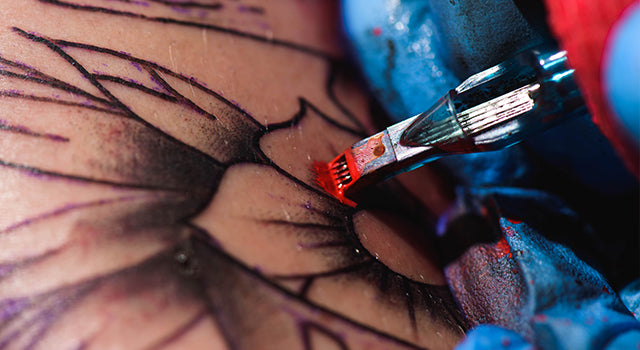
Antibacterial and Fragrance-free Soaps Only
Antibacterial and fragrance-free soaps:
- Antibacterial soaps effectively kill bacteria, preventing infection.
- Fragrance-free soaps reduce the likelihood of skin irritation.
What to Look for:
- When selecting a soap, ensure it is both antibacterial and fragrance-free.
- Avoid soaps with harsh chemicals or strong scents, as these can be harsh on healing skin.
Washcloths, Loofahs, Scrub Brushes
Avoid Abrasive Tools: Tools like washcloths, loofahs, or scrub brushes can harm the delicate healing skin and potentially pull out the ink.
Use Your Hands:
- Instead of using these tools, rely on the gentle touch of your clean hands for cleaning.
- Pat the tattoo dry with a clean, soft paper towel, or let it air dry to avoid unnecessary friction.
Keep Your Covering On Shortly
When you first get your tattoo, your artist will cover it with a bandage or plastic wrap to protect it from bacteria and other environmental irritants. Leaving this covering on too long can create a moist environment that promotes bacterial growth and could lead to an infection.
It's typically recommended to remove the body after 2-3 hours. After removal, clean the area gently with mild, unscented soap and warm water.
Never Pick At Your Scabs
As your new tattoo heals, it may peel or form scabs. While this can be slightly uncomfortable, it’s crucial to the healing process. Picking at scabs can cause the ink to fade and may even lead to scarring. Instead, apply a gentle, fragrance-free moisturizer to soothe the itchiness and promote healing.
No Swimming, Soaking, or Shaving
Activities that expose your tattoo to excessive moisture or potential irritants should be avoided until your tattoo has fully healed. This includes strenuous exercise that causes heavy sweating, swimming in pools or natural bodies of water, soaking in a bath, and shaving the area around your tattoo. These activities can slow down the healing process and increase the risk of infection.

Avoid Sun Exposure
Direct sunlight can be damaging to a new tattoo. UV rays can fade the ink and prolong the healing process. Keep your tattoo covered outdoors, or use a tattoo-specific sunscreen for protection until your tattoo is fully healed.
Faster Tattoo Healing: Essential Aftercare
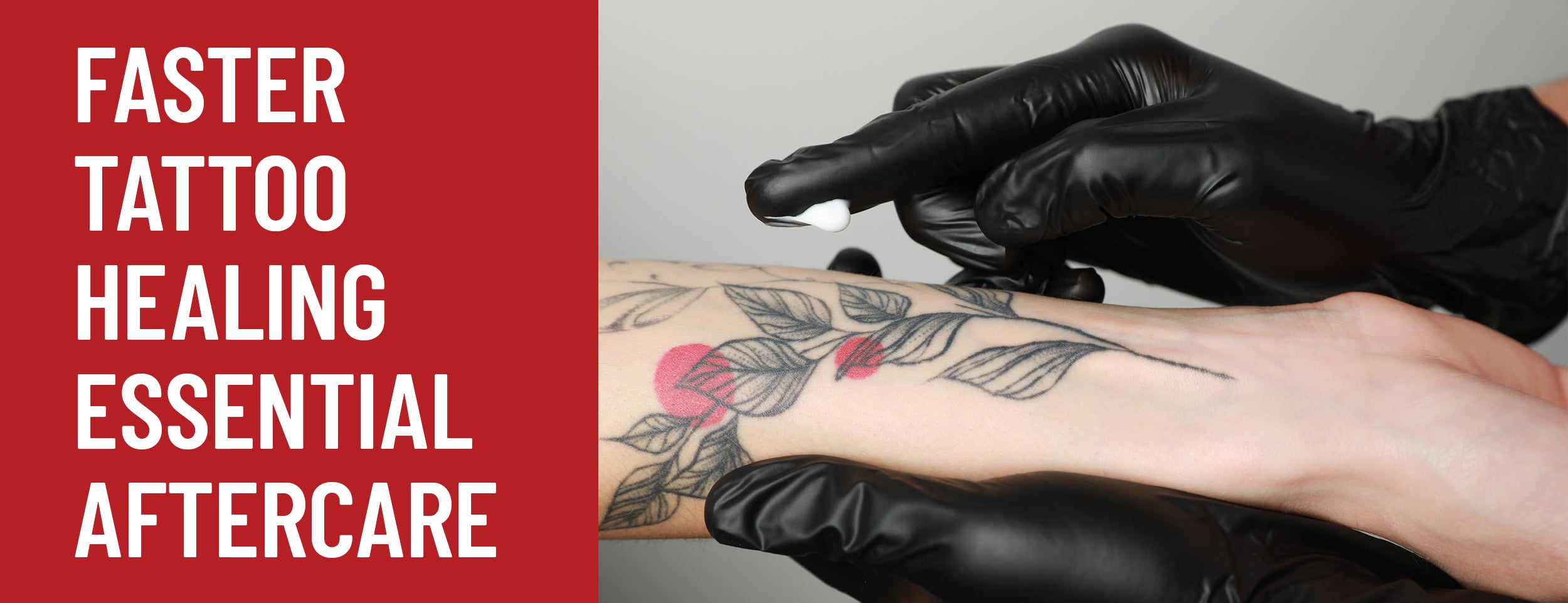
Choosing the right aftercare products is crucial to expedite the healing process of your new tattoo and ensure its vibrancy. We will explore essential aftercare products and how to use them effectively.
Product Selection for Aftercare
- Not all aftercare products work the same way. When choosing an aftercare product, ensure it is specifically designed for tattoos.
- Stick to tattoo aftercare products that contain natural and safe ingredients. Harsh ingredients can irritate your skin and delay the healing process.
- Do not overapply your aftercare product. A thin layer is needed on the tattooed area to allow your skin to breathe and heal properly.
Use Unscented Lotion
- Unscented lotion is the best moisturizer after a new tattoo. Fragrances and chemicals in scented lotions can irritate the tattooed area and cause infection.
- Apply lotion gently, and do not rub your tattoo. Lightly patting the area helps to ensure the cream is absorbed evenly.
Leave Your Dead Skin On
- It is important not to scratch that may develop around your tattooed area.
- Allow dead skin to peel off naturally to avoid damaging the fresh tissue underneath.
- Picking or pulling off scabs can lead to infection, scarring, and discoloration, all of which will impact the overall appearance of your tattoo.
Soothe the Area With Cooling Lotion
- After being tattooed, your skin will become very sensitive in that area. Cooling lotions provide instant relief and reduce redness.
- The best time to apply cooling lotion is after washing and drying your tattooed area.
- Cooling lotions not only ease the pain and swelling but also promote healing by activating the body's natural healing process.
Use the Right Amount of Moisturizer
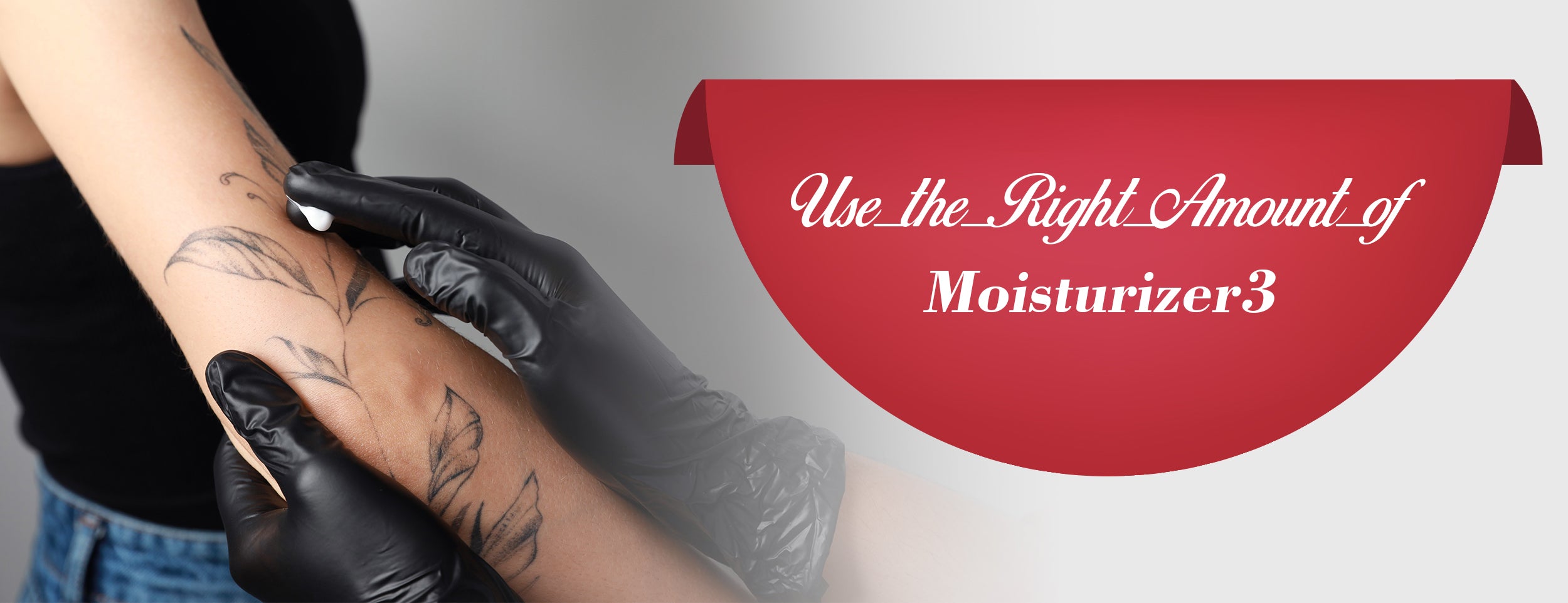
- Proper hydration is essential for tattoo healing. However, over-hydrating can be just as harmful.
- Too much moisturizer will suffocate your tattoo, trap bacteria, and impede healing. Only use enough lotion to keep the area moist and ensure the skin gets adequate hydration.
Regular Moisture Matters
Maintaining your tattoo's moisture level is vital for faster healing. Your skin needs to stay hydrated to prevent cracking and scabbing, which could distort the tattoo’s appearance. Use a fragrance-free lotion or a specific tattoo aftercare product recommended by your tattoo artist. Apply the moisturizer gently several times a day, but remember not to overdo it – too much moisture can also hinder the healing process.
Stay Dry (Whenever Possible)
Although regular moisturizing is important, keeping the tattoo dry whenever possible is equally essential. Avoid soaking the tattoo in water for long periods, such as during bathing or swimming. Excessive exposure to water can wash away the ink and delay the healing process. Instead, opt for quick showers and avoid direct contact with the water stream on your fresh tattoo.
Use Fresh Towels & Sheets
Hygiene plays a key role in tattoo aftercare. Always use clean, fresh towels to pat your tattoo dry after cleaning it. Similarly, ensure you're sleeping on clean sheets. Dirty towels or sheets may harbor bacteria that could potentially infect your tattoo.
Wear Loose Clothing
Tight clothing can rub against your new tattoo, causing irritation and possibly leading to infection. Furthermore, it can stick to the tattoo and peel away the scabs prematurely, affecting its appearance. Opt for loose, breathable clothing that won’t stick to your tattoo.
Consult A Doctor If Needed
While following these steps should generally lead to a smooth healing process, there may be instances where you notice signs of infection, such as excessive redness, swelling, or pus. If this happens, it's important to consult a healthcare professional immediately.
How Tattoos Heal Faster: Avoiding 4 Common Mistakes
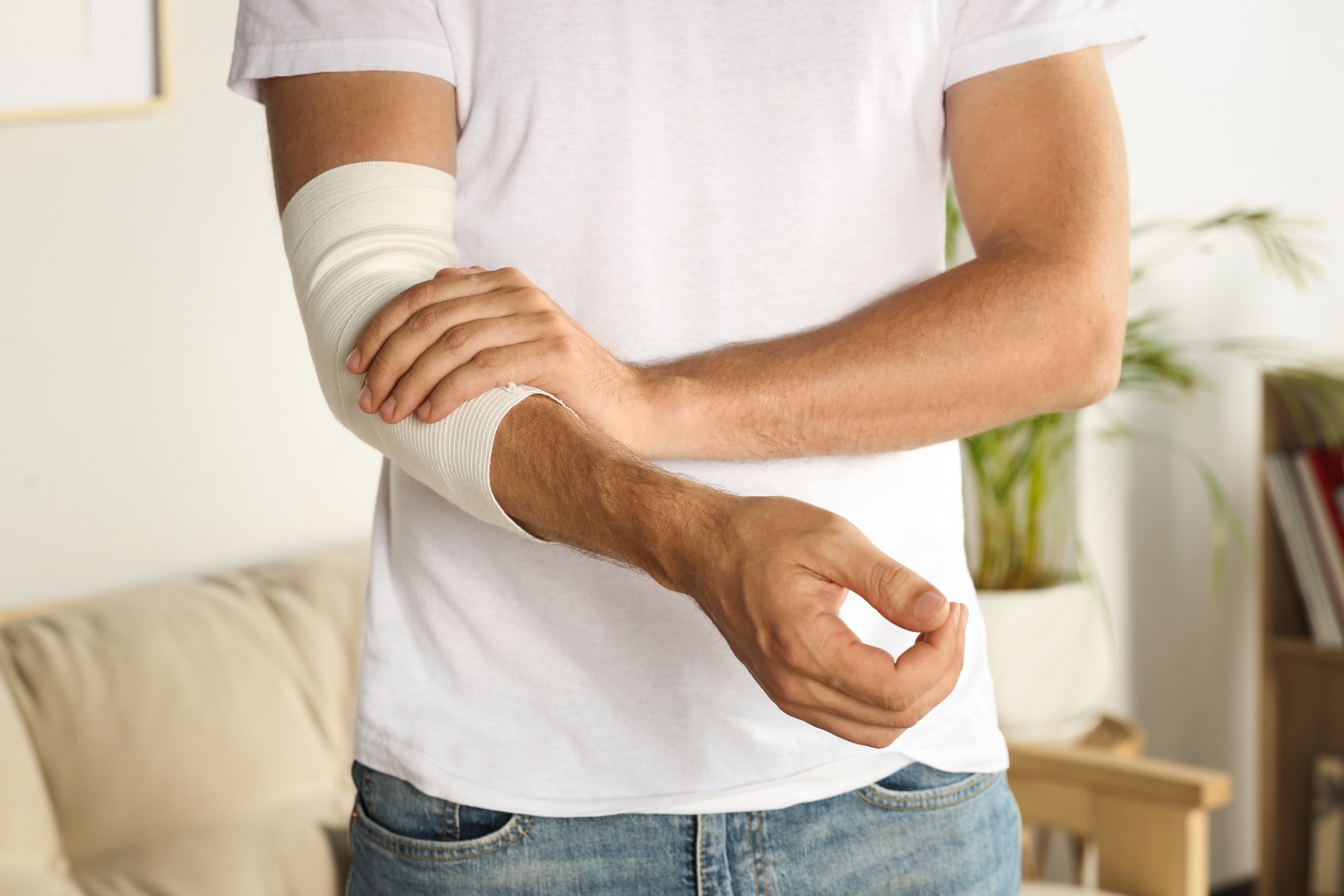
Proper care during tattoo healing ensures your new ink's longevity and vibrancy. Many individuals make common mistakes that can impede recovery and affect the final result. Let's explore these mistakes and learn how to avoid them.
Don't Re-Bandage
- Importance of Initial Bandage: After getting your tattoo, your artist will apply a bandage to protect it from outside contaminants.
- Mistake: Re-bandaging the tattoo after you remove the initial bandage can trap bacteria against your healing skin, leading to infection.
- Tip: Follow your artist's instructions regarding when and how to remove the initial bandage, usually within a few hours. Once removed, leave the tattoo exposed to the air to aid healing.
Don't Scratch or Peel
- Normal Itching and Peeling: It's common for tattoos to itch and for the skin to peel during healing.
- Mistake: Scratching or picking at the tattoo can damage the delicate new skin and pull out ink, leading to uneven healing and potential scarring.
- Tip: Gently pat or tap the itchy area instead of scratching. Applying a fragrance-free, hypoallergenic moisturizer can also help alleviate itching.

Avoid Bathing in a Tub
- Tattoo and Bathing: Water can harm a healing tattoo, especially if submerged for prolonged periods.
- Mistake: Soaking your fresh tattoo in a bath, hot tub, or swimming pool can introduce bacteria and irritants to the healing skin.
- Tip: Stick to quick showers during the initial healing period, and ensure the water isn't excessively hot. Avoid exposing your tattoo to excessive moisture, slowing the healing process.
The Dangers of Hot Water
- Heat and Healing: Elevated body temperature can affect the blood flow to the tattooed area and slow healing.
- Mistake: Using hot water for showers or baths and engaging in activities that induce excessive sweating can hinder the healing of your tattoo.
- Tip: Opt for lukewarm or cool water during showers, and avoid saunas, hot tubs, and intense physical activities that can make you sweat excessively while your tattoo heals.
Conclusion
Getting a tattoo is a big commitment; aftercare is just as crucial as the tattoo itself. To help your tattoo heal faster, avoiding common mistakes during the healing process is essential. Additionally, incorporating good hygiene habits, such as cleaning the tattoo with lukewarm water and antibacterial soap, can prevent infections and promote faster healing.
Using the right type and amount of tattoo aftercare products and adopting healthy lifestyle habits such as wearing loose clothing and staying hydrated can also significantly impact healing. These tips can help your tattoo heal faster and maintain its vibrancy for years.

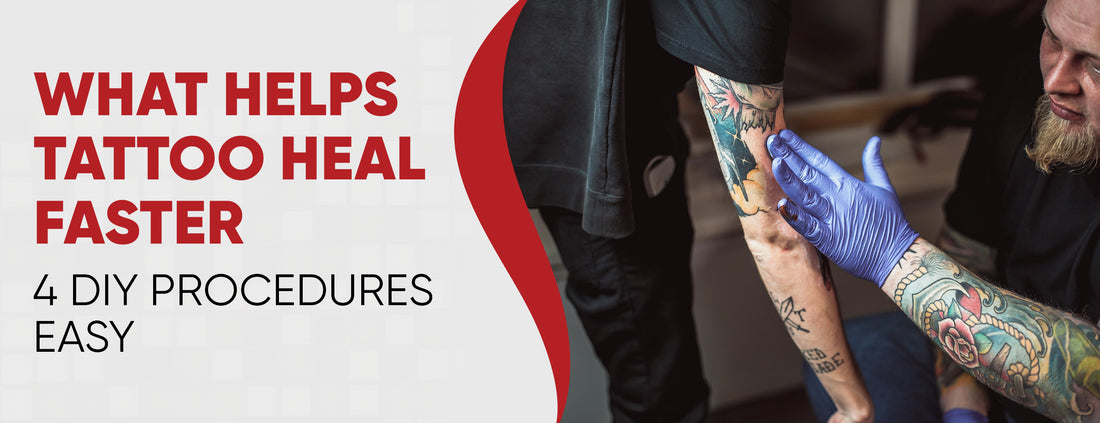







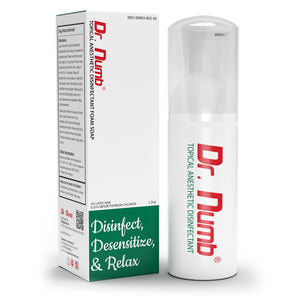


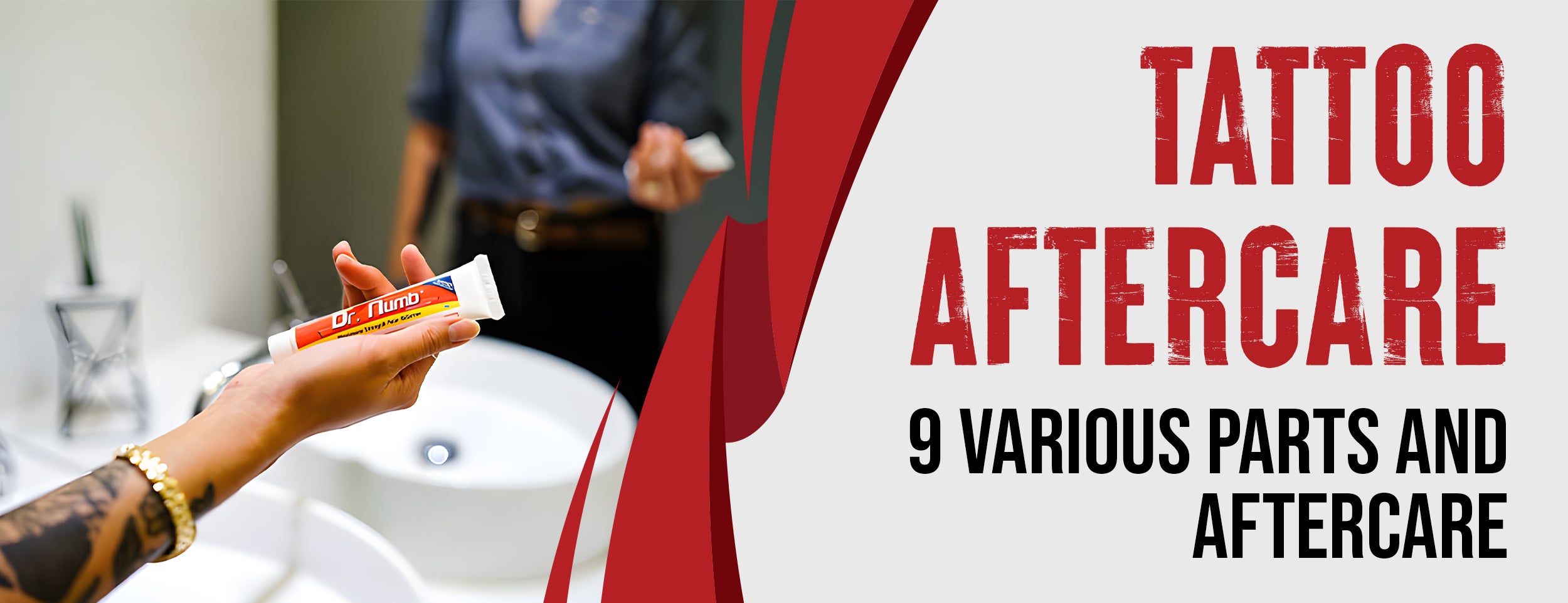
![Antibiotics and Tattoos: 3 Risks and 3 Effects [with 4 Precautions]](http://drnumb.com/cdn/shop/articles/Can_You_Get_Tattooed_On_Antibiotics__3_Risks_and_3_Effects_4_Precautions.jpg?v=1714128292)

